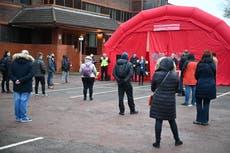Oxford Covid vaccine offers 76% protection for up to 12 weeks after first dose, study shows
Vaccine may also reduce transmission of the virus by 67 per cent, researchers say
The Oxford coronavirus vaccine offers 76 per cent protection for up to 12 weeks after the administration of a first dose, new analysis suggests.
Researchers at the University of Oxford said their vaccine may also reduce transmission of the virus by 67 per cent.
The vaccine’s effectiveness in preventing Covid-19 disease rises to 82.4 per cent once a second dose is administered after three months, according to a pre-print paper released on Tuesday.
Oxford’s scientists said the findings, which are currently under review by The Lancet, supported the UK government’s decision to extend the interval between the first and second doses, having faced widespread criticism over the policy.
“These new data provide an important verification of the interim data that was used by more than 25 regulators including the MHRA and EMA to grant the vaccine emergency use authorisation,” said professor Andrew Pollard, chief investigator of the Oxford vaccine trial.
“It also supports the policy recommendation made by the Joint Committee on Vaccination and Immunisation (JCVI) for a 12-week prime-boost interval, as they look for the optimal approach to roll out, and reassures us that people are protected from 22 days after a single dose of the vaccine.”
The health secretary, Matt Hancock, welcomed the findings, saying the study was “really encouraging” and that “vaccines are the way out of the pandemic”.
Analyses of coronavirus swabs in the UK population suggest the vaccine may have a substantial effect on transmission of the virus, with a 67 per cent reduction in positive results among those vaccinated in the British arm of the Oxford trial.
This is the first time that indicative data on the vaccine’s ability to halt the spread of coronavirus has been published.
The new findings are drawn from a further 201 cases of Covid-19 that were recorded in the Oxford trials, held in Britain, South Africa and Brazil, up to 7 December.
No one out of the 12,408 people vaccinated with a single dose of the vaccine was hospitalised with Covid-19 from 22 days after immunisation, the study shows.
Oxford said the dosing interval had a “pronounced” impact on the vaccine’s efficacy. The paper said that vaccine was 82.4 per cent effective when a second dose was administered after 12 or more weeks, compared to 54.9 per cent where the booster was given under six weeks after the first dose.
Scientists at the University of Oxford said their analysis suggested that it is the dosing interval, and not the dosing level, which has a greater impact on the efficacy of the vaccine.
This is in line with previous research carried out into the prime-boost intervals adopted for the influenza, Ebola and Malaria vaccines, the university said.
Earlier this month, AstraZeneca’s research chief said the eight to 12-week interval between doses seemed to be the “sweet spot” for efficacy, contrasting with US drugmaker Pfizer, which warned that its own candidate was not trialled with such an interval.
The European Medicines Agency flagged concern that there is not enough data to determine how well the Oxford vaccine will work in people aged over 55, but university scientists and AstraZeneca have stressed that it works in all age groups.
Stephen Evans, a professor of pharmacoepidemiology at the London School of Hygiene & Tropical Medicine, said the extra data and analyses released by Oxford are “very helpful”.
“The data definitely provide some evidence to suggest that the eventual protection from two doses of this vaccine are not worsened by having a longer than 28 or 42 day period between doses and tend to confirm what had been shown before, that if anything the eventual efficacy was better,” he said.
“While these data should not be taken to say that all questions are answered, they certainly do not suggest that the JCVI advice on dose-spacing was in any way incorrect for this vaccine.
“It does not directly address the same questions for other vaccines but there are no good reasons or data to suggest that they would have markedly dissimilar results.”
Oxford is expect to release further analysis on the ability of its vaccine to neutralise the different coronavirus variants in the coming days.
Separately, two new studies released on Tuesday showed that the Covid-19 vaccine developed by Pfizer and BioNTech appears to be effective in providing protection against the UK variant.
However, experts from the University of Cambridge found that when a mutation, known as E484K, was introduced to the variant, “substantially higher levels of antibody were required” to neutralise the virus.
According to the scientists, their findings, which have not yet been peer-reviewed, suggest the Pfizer/BioNtech vaccine may be less effective when dealing with the E484K mutation, which features in the South African and Brazilian variants.
Cambridge researchers analysed blood samples from 26 individuals between the ages of 29 and 89, who had received their first dose of the Pfizer vaccine three weeks ago.
The team extracted serum, the fluid part of the blood which contains antibodies, and then exposed to lab-made versions of the Sars-CoV-2 – the virus that causes Covid-19.
The team found the UK variant required around twice the amount of antibodies to neutralise the virus, when compared to previous, older versions of the virus.
When the E484K mutation was added, it required an almost 10-fold increase in the concentration of serum antibody for neutralisation, the researchers said.
Join our commenting forum
Join thought-provoking conversations, follow other Independent readers and see their replies
Comments

Bookmark popover
Removed from bookmarks